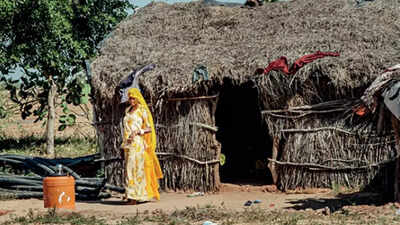Top Searches
- News
- India News
- Govt considers increasing IAS trainees’ village stay to 3 weeks
Govt considers increasing IAS trainees’ village stay to 3 weeks

NEW DELHI: Lal Bahadur Shastri National Academy of Administration, which trains civil servants, is contemplating increasing the duration of the ‘village stay’ component, which is part of the 53-week district training programme of IAS trainees, to three weeks from the current one week.
“The academy is exploring the option of a three-week village-stay module in the district training phase,” the department of personnel and training (DoPT) informed the parliamentary standing committee on personnel, public grievances and law and justice in its action taken report on the recommendations made in 112th report of the committee on demands for grants pertaining to the DoPT. The action taken report was tabled in Parliament during the just-concluded winter session.
The DoPT said that LBSNAA — based on recommendation of the standing committee itself — was exploring the option of the three-week village stay module, during which the trainees can be directed to stay in tribal hamlets, remote villages in difficult terrain, and learn the core values of ‘ability, anonymity & austerity’ through living with the villagers.
As of now, the IAS district training programme, covering a duration of 53 weeks, comprises a one-week village stay component. During this one week, the trainee IAS officers stay in the village and interact with village functionaries like anganwadi workers, auxiliary nurse midwives, accredited social health activists, teachers and other field-level functionaries of different departments. This is meant to make the trainee IAS officers understand the perspective and roles of different grassroots functionaries. “The probationer is expected to stay in the village during this period and interact closely with people and functionaries,” DoPT told the standing committee.
Earlier, the standing committee had taken the view that LBSNAA needs to re-orient its training programme to make young civil servants sensitive to the needs of the general public, especially the marginalized and the vulnerable.
“Lal Bahadur Shastri National Academy of Administration needs to integrate class-room based theoretical training with experiential training in real settings. During the course of training, LBSNAA may assign young officer trainees to tribal hamlets, remote villages, areas with harsh terrains and difficult conditions for two-three weeks, completely disconnected from mundane life and enable them to get first-hand experience about the challenges faced by these groups of people on day-to-basis,” the committed had stated. The panel added that it was confident that the aforesaid change — longer village-stay component in the training of IAS officers — will go a long way in bridging the gap between the government and the governed.
“The academy is exploring the option of a three-week village-stay module in the district training phase,” the department of personnel and training (DoPT) informed the parliamentary standing committee on personnel, public grievances and law and justice in its action taken report on the recommendations made in 112th report of the committee on demands for grants pertaining to the DoPT. The action taken report was tabled in Parliament during the just-concluded winter session.
The DoPT said that LBSNAA — based on recommendation of the standing committee itself — was exploring the option of the three-week village stay module, during which the trainees can be directed to stay in tribal hamlets, remote villages in difficult terrain, and learn the core values of ‘ability, anonymity & austerity’ through living with the villagers.
As of now, the IAS district training programme, covering a duration of 53 weeks, comprises a one-week village stay component. During this one week, the trainee IAS officers stay in the village and interact with village functionaries like anganwadi workers, auxiliary nurse midwives, accredited social health activists, teachers and other field-level functionaries of different departments. This is meant to make the trainee IAS officers understand the perspective and roles of different grassroots functionaries. “The probationer is expected to stay in the village during this period and interact closely with people and functionaries,” DoPT told the standing committee.
Earlier, the standing committee had taken the view that LBSNAA needs to re-orient its training programme to make young civil servants sensitive to the needs of the general public, especially the marginalized and the vulnerable.
“Lal Bahadur Shastri National Academy of Administration needs to integrate class-room based theoretical training with experiential training in real settings. During the course of training, LBSNAA may assign young officer trainees to tribal hamlets, remote villages, areas with harsh terrains and difficult conditions for two-three weeks, completely disconnected from mundane life and enable them to get first-hand experience about the challenges faced by these groups of people on day-to-basis,” the committed had stated. The panel added that it was confident that the aforesaid change — longer village-stay component in the training of IAS officers — will go a long way in bridging the gap between the government and the governed.
FOLLOW US ON SOCIAL MEDIA
FacebookTwitterInstagramKOO APPYOUTUBE
Start a Conversation









